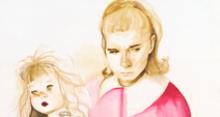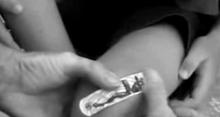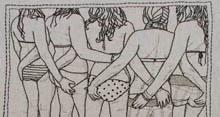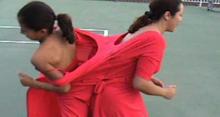Additional Stories
Letter to My Daughter
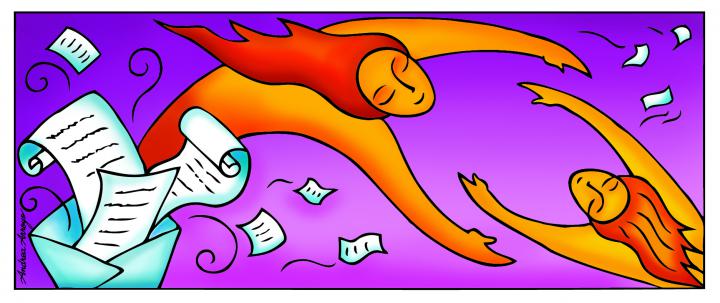
To be read after your twenty-first birthday, December 24, 2007
Dearest Rosa,
Now you are grown up I am writing you a letter that I hope won’t come out as a succession of apologies – which strikes an apologetic note straight away. A working mother's place is in the wrong; we all know that. But I bet I apologise at least once more before this letter is through.
I am writing to tell you what it felt like to be a mother and a novelist. Though I would be more interested to know what it was like from your point of view, truthfully.
(Hang on – how much truth could I take?)
I want to say first that for a woman it is still the greatest luck to be able to work at something you love and also have a family. My mother, your green-eyed gipsy-ish Grandma Aileen, did not enjoy the same luck, though for a while she taught in your grandfather's school. She was clever and organised, and could have done anything, but with three children, and married to a man who needed to be the breadwinner and liked to have a wife at home, she had few choices. Her mother, your great-grandmother, certainly did both work and have a family, because she came from the working class, but raising seven children while working as a domestic servant was not an easy life.
Whereas being a novelist is surely light work. Or is it?
You know it isn't, darling, because you have seen the piles of drafts spread over the floor, you've heard, probably with increasing skepticism, the number of times your mother has announced "I've finished!" – only to set off polishing and cutting again. You remember how the sheer number of hours at my computer gave me crippling repetitive strain injury, so that for a few months I couldn’t pick you up or cuddle you or shop. You remember both the good days when I was earning a lot of money from my novels, and the less good days when I was frustrated by having to do endless reviewing, lecturing and examining to pay my half of our enormous mortgage while also trying to live my real life as a writer and a mother.
I always told you that having a daughter was the best thing in the world. But how could you square that with what you must have sometimes noticed was my impatience to get on with my work, my eagerness for you to go and play or stay with friends, my unwillingness to prolong bedtime chats because I knew I still had work to do before my own bedtime, my complaints that you and your father left the dirty work in the house to me. I complained, God how I complained. I have always detested housework, but I like a pretty, welcoming, orderly house – it matters to me much more than it does to you and your father, so maybe it was fair enough that I had to make it happen. But I hope you will either live in a tent or be rich enough to pay other people (well) to do that donkey-work for you, so that you can spend your time on more enjoyable things, like love and your real work.
It would be silly to deny that powerful mothers can be a problem (though even as I write that I can imagine your face grinning at me and saying "So you think you're powerful, Mum? Big mistake…") But the problem was very clear to me when you said wistfully, still at primary school, a day or two after some conversation among the adults about my absurdly over-academic past, "Mummy, do I have to get four degrees?" I was horrified, and saddened (and said No, no, no—for heaven's sake, I only did what I did to please my mother, whose family had no money to send her to college, and we can't carry on like that for ever, passing duties across the generations). But your question made me understand something that stood me in good stead afterwards; you had to know that your path was your path, and not mine.
I confided in you about the balancing act between love and work long before you should have had to think about things like that. And I know how much I admired your amazing good sense and independence of mind when you said, as I pushed you along in your pushchair one day and wittered and worried to you about my work, "Big people can’t be friends with little people." You had to say it twice before I took it in. You were telling me what I should have known, but had temporarily forgotten. And you were only three. But of course, when you were not yet two, and just starting to use sentences, I helped you out of the bath one day and you stood there gleaming and dripping wet and said to me with an enormous gummy grin of astounded realization "I'm a person! I'm a person!" You always were.
I went through a long bad patch with my work when you were between nine and twelve. It coincided with a time of climactic change at your father's work-place and you knew we were worried about money. Should we have hidden it from you? Probably. It was a lot for you to take, but my feeling was it would be worse for you to see me depressed and anxious and not know why. I only knew you felt all right about it again when my new novel had come out and been well reviewed and you started feeling safe enough to make rude jokes again about your mother's general incompetence.
When were the worst days?
—When I had a deadline and you were ill and couldn’t go to school, so I neither looked after you, nor did my work, as well as I should have done. Luckily after your first few years you have been robustly healthy and rarely had days off. Which makes me consider my own mother's saintly patience, looking after a daughter who was almost never at infants' school in winter because of asthma, and who malingered considerably throughout her teens. I particularly remember my "tickle your nose with a hair-grip" technique for making myself sneeze. Mum always pretended to be fooled. Perhaps she liked my company. I love your company too, but I saw schooldays as a heaven-sent opportunity to work without neglecting you – so was not the most amenable of mothers to hints about bunking off.
There were days when the balancing act didn’t work. The year at primary school when suddenly you, always sociable and gregarious, didn't have anyone to play with, and would say, every night it seemed, just as I was tip-toeing away from your bedside, in a small determined voice, "I didn’t have anyone to play with at playtime today." It always cramped my stomach with anxiety and brought me back, to reassure you, in theory, but actually to reassure myself. Because when I was your age, friendlessness was a permanent and horrible state, and although I always told you it wouldn’t last, in my heart of hearts I was afraid you were going to be like me. And then with that fear in my breast I couldn’t work later. (I know this sounds as though I'm saying it hurt me more than it hurt you, which is rubbish— but I think parents are always least good at coping with their children's suffering in the same way as they did. In any case, in the end you weren't really at all like me, were you? That period passed away like a dream. You make friends easily now, and keep them.)
And other bad moments. When I was asked to go on a six-week readings tour of Tasmania and Australia, and my publisher, herself a mother, offered to send you with me. In theory it was a wonderful offer, but in practice it would have been a nightmare, because I could never manage to be a performing writer and a mother at the same time; I should have been torn in two. I said no to her offer, and yes to the readings tour, but dropped out two weeks before the event, with deep shame, because I couldn’t bear to leave you for so long—you were only three or four, I think.
What else?—When I was trying to talk to publishers or commissioning editors on the phone when you were small, and you, regular as clockwork, came and tried to reclaim me, snatching the phone or talking loudly or wailing with jealousy, to the consternation of the person on the other end of the line.
—When I felt completely split about whether or not to accept an invitation to travel, because I have never liked leaving you. (It shows, in retrospect, in the letters and postcards I wrote you every day when I did go away for a week to teach or write. Some of them survive, and when I look at them I see they are full of love, but also reek of guilt – trying too hard, in the way that Sylvia Plath's letters home to her mother have false notes of guilt and trying to be good. Guilt can go both ways between the generations it seems. I hope you noticed only the love.)
And yet I cannot deny that I adore having time completely alone, because then I can imagine things in a different way, with infinitely greater clarity and boldness. The mother and the writer seem to live in two completely different parts of my brain. I am amazed by Fay Weldon's saying she wrote best at the kitchen table while breast-feeding a baby, because I write best in my study with the door closed. Until you were around ten I never tried to do my real writing while you were in the house, unless you were asleep, that is. The mother has to be pliable, adaptable, other-centered, personal, emotional; the writer needs detachment and a degree of steel.
What were the best times?
—I know perfectly well that sometimes you were proud of me and glad that your mother did something interesting.
—When you came home from school and were happy to see me there, and I'd had my working day and was happy to see you too. "Any goss, Rosa?" I would say, which was our word for gossip, and we would exchange whatever we had over tea and crumpets in winter. The unparalleled happiness then of knowing I had both work and love.
—When something at work had gone well and we celebrated as a family, perhaps with an evening walk and picnic in the sunset park and a game of Roundwood Rounders round the big circle of plane trees.
—When you came to a reading I did once, because our babysitting had broken down, and I read a short extract from the new book, as per usual, and then, at the end of the session, asked the audience if there were any more questions, and you put your hand up and said urgently, "Will you read the rest of the story?"
—When you made me glorious multi-coloured, starred and stickered, capitalized and exclamation-mark-dotted cards to say "Well done" at the end of a book. (I have them all, darling. Shall keep them always.)
—When, without my knowing you were doing it, you read the first chapter of a book I had had problems with and said to me "I really want to read this book. I think it's going to be my favourite."
—When you showed your rare qualities of empathy and imagination and somehow treated me as a person as well as your mother. “I'm a person,” remember? Perhaps because you felt that way about yourself, you could sometimes give me the same licence. Sometimes, of course, you couldn’t, and rightly so, because you just needed a mother, and not to have to think about the rest. Children have a right to more needs than mothers.
Did things get easier as you got older? Not necessarily. Babies sleep a lot; teenagers hardly seem to sleep at all. Teenagers have house-sized personalities, and need heart-to-hearts at midnight. Teenagers love and hate volcanically and can strip the parental ego to nothing in seconds…On the other hand, something else is beginning. Both of you can see the end is in sight.
You became more precious as you became more difficult. You, my beloved child, were going beyond me, finding your own goals, your own peers, your own satisfactions. You started to get your own creative pleasure from your own projects— directing a play, writing a long short story, cooking an elaborate meal, making a denim shoulder-bag dripping with stars and sequins, safety pins and peace badges.
Have I made it sound, in this letter, as though there is always a tussle between motherhood and creativity? If so, I have sold motherhood short. There is a tussle for time, true. Two lives would be better than one. But if I had not had a child, half of the one life we get would have been closed to me. There is a freemasonry of parents, chatting in the park by the sandpit in the green slow summer, complaining round the school gate at sunset in winter, laughing in the kitchen over a cup of tea about the things they are failing to get right, which I could never have joined without you. There are kinds of tenderness I should not have known. I should never have understood my place in a chain of lives, a pattern of history, if you had not carried that line on into the future. You helped me to understand what small amount I have managed to understand about this life. Your presence is in my novels Grace and Lost Children, and your absence – by which I mean, what you have taught me about childlessness – is at the centre of Where Are the Snows and The Ice People.
I don’t know if having a creative mother makes it easier or harder to be creative yourself. I know I haven’t encouraged you to write novels, although you write with wonderful ease and fluency and in a quite different style to me, because I don’t think children should be what their parents have been, and because I'm not sure if someone sociable should ever be a novelist. But if that's what you want to be, I hope you'll do it and completely ignore your mother's discouragement.
I know that because my life has been shadowed by money worries I have probably emphasized too much with you the importance of financial security, a subject which my parents never once broached with me. The trouble is, parents want their children to be rich, happy, and creative; but also idealistic, thoughtful, and sensible. We want everything for you, but fortunately have neither the right to ask it nor the power to give it, because in the end you have to do everything for yourself, and find your own way, and fall into your own errors just as I still fall into mine.
Finally I want to repeat that you have been the best thing I have made (with your father's help) and also the most original, and unpredictable, because, thank goodness, unlike my novels you are not under my control. You are yourself. I hope you know that still and can be yourself with more ease and less of a struggle than your mother could. I wish you both motherhood and creativity, in whatever field. I hope you carry on the slim but strong female line in our largely male family; I hope you catch on earlier than I did how fantastic having children is, and so manage to have more than I did, because I have wished very much that you had a sister or brother to fight with and have fun with. I wish you a partner both as loving as your father is, and as committed to letting the mother of the family have a life, and space, of her own. I hope you feel the beauty and strangeness of life as strongly as me, but in your own way.
And here comes that apology; I am sorry for all the things I got wrong; they were because I knew no better or could do no better. I bet that you yourself will do better, and I hope I live long enough to see it. I shall always love you with all my heart.
Your mother
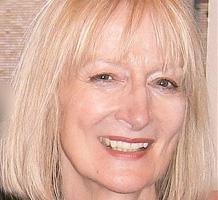
Maggie Gee has written eleven critically acclaimed novels, including My Cleaner, The White Family, short-listed for the Orange Prize and the International Impac Prize, a collection of short stories, The Blue, and this year a memoir of her life as a writer and a woman, My Animal Life. She is vice president of the United Kingdom’s Royal Society of Literature and was its first female chair of Council, 2004-2008. Her books have been translated into fourteen languages, including Chinese, and she is Visiting Professor of Creative Writing at Sheffield Hallam University. Her themes include war, the relationship of the human species to other species, the origins of racism and the complications of modern families. Three of her books, The Ice People, Where Are the Snows and The Flood, are set in the future and were centrally concerned with climate change. But her books are frequently funny as well as serious. Her most recent pair of novels, My Cleaner and My Driver, are satires about the relationships between Britain and Uganda after the end of empire, turning around the complex friendship between a British writer and a Ugandan one who used to work for the former as a cleaner, both written in the first person.
Illustration by Andrea Arroyo
Related Content
|
Catherine Haley Epstein’s paintings touch on the many ways women’s identities shift and change when they become mothers. |
This short film illuminates the economic value of mothers’ work and the need for policies in the U.S. to effect life/work balance for mothers. |
Kathy Halper's tongue-in-cheek, Facebook-inspired embroideries explore how technology affects the modern mother/child relationship. |
Maria Adela Diaz’s video performance demonstrates the mother-child bond and the need for “Detachment” in order for both to grow as individuals. |
